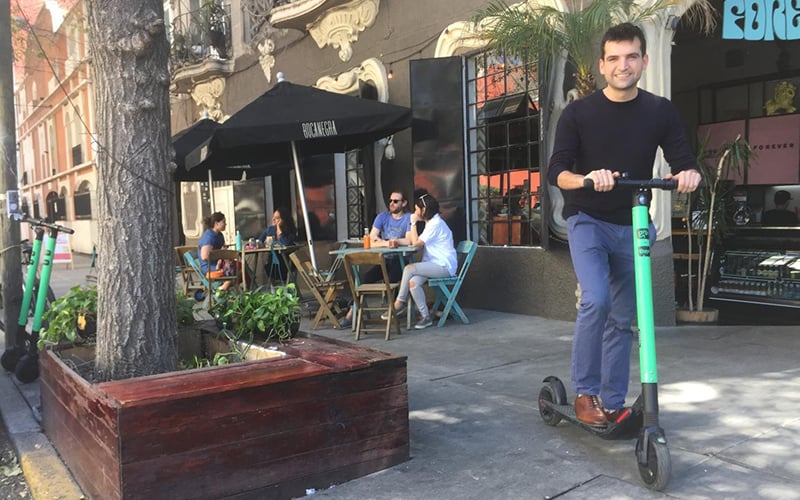MEXICO CITY – You’ve probably seen, or used, these two-wheeled vehicles for rent. They’re electric shared scooters, an exciting device for many, but a dangerous one for others.
Like in metro Phoenix, electric shared scooters arrived in Mexico City with disruptive technologies and concerns. While some see in them innovation and an opportunity to fight urban problems such as air pollution or traffic, others believe these vehicles need to be regulated – or even eradicated.
Let’s start with an embarrassing anecdote: I went to Parque México, in Mexico City. It’s a very popular and old park with many electric shared scooters in this area. It’s the ideal place to try them for the first time.
Starting the scooter was simple: Scan the QR code with the service provider’s cellphone app. It costs about 50 cents U.S. to start it and about a dime per minute.
But the tricky part was to actually ride the scooter. So I tried and tried and tried – and failed.
But I’m not the only one facing difficulties: Companies that handle these vehicles are struggling all over the world, as some local governments fear of risks to users, pedestrians and drivers.
Mexican company with Mexican problem
“We always like to work hand in hand with the government, because we know that’s the only way to provide the service,” said Beriana Mendoza, head of communications of Grin, a shared electric scooter company from Mexico City.
Grin started to operate last year, and now it’s in 18 cities in Latin America, becoming the first company of its kind in the region.
“We do want to expand, but there’s some safety issues and some infrastructure issues,” Mendoza said.
Mexico City’s new government decided to revise the scooter contracts and regulations recently. Right now, companies work under a pilot program, expecting restrictions to their operation zones and number of vehicles.
Mexico City’s Secretary of Mobility, the authority handling scooter operations, declined an interview request.
Mendoza said scooters help the city by providing cheap transportation and reducing car usage.
“Scooters mean less cars in their neighborhoods,” said Mendoza, stating that her company protects its users through insurance – as well as third parties – involved in an accident. They also built agreements with businesses to create parking areas for the scooters.
And as for air pollution, Grin officials said the more than 640,000 rides they’ve had in Mexico City represent 250 tons less of carbon dioxide emissions.
Local issues, international presence
Other companies face different battles. Lime, a San Francisco-based corporation with presence in more than 100 cities across the world, started in October in Mexico City. It’s about to expand to Puerto Vallarta, while also operating in Cancún.
Jason Wilde, the head of Lime’s business global operations, said regulations and infrastructure are two “big barriers.”
They’re similar barriers found in metro Phoenix. Arizona State University banned scooters on campus in October. New regulations in Tempe included fees that Lime considered costly, and the company decided to leave.
“When Lime is not in the market, it’s not just Lime that hurts, it’s actually the individuals and the residents of those cities that have fewer mobility options,” Wilde said.
The executive said Lime has to do what’s right for the company and its customers. But he believes the current experiences will eventually help redesign cities. He envisions special lanes for shared vehicles everywhere, just like those in many parts of Mexico City.
And what about adding a lane at ports of entry for cross-border trips?
“Ha! Well, I think that one is above my pay grade. I would only hope! I would only hope,” he said.
Changes and controversies
Back in Mexico City, I found Nico Bohr, a German who moved here a couple of months ago and frequently rides scooters.

Nico Bohr, who is from Germany, lives in Mexico City and uses shared vehicles, such as electric scooters and bikes. (Photo by Rodrigo Cervantes/KJZZ)
For him, the disputes will end when companies, governments and residents adjust to each other.
“There’s always gonna be controversy when there’s a change,” Bohr said. “For me, this is definitely more part of the solution than part of the problem, but I can see how it makes people think differently if they don’t feel respected in the way it’s implemented, right?”
And while the debate goes on, just like those scooter companies, I’ll continue my endeavor – and keep trying to ride an electric scooter.
The Fronteras Desk is a unique KJZZ project that covers a wide expanse of an under-covered news desert that stretches from northern Arizona deep into northwestern Mexico.
This story is part of Elemental: Covering Sustainability, a multimedia collaboration between Cronkite News, Arizona PBS, KJZZ, KPCC, Rocky Mountain PBS and PBS SoCal.
AlertMe
